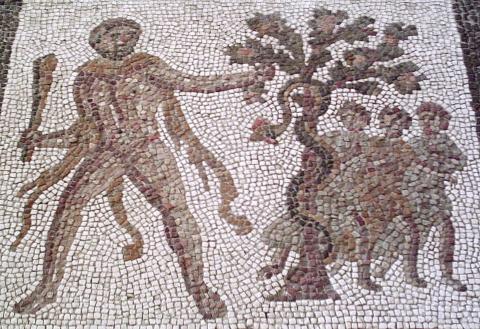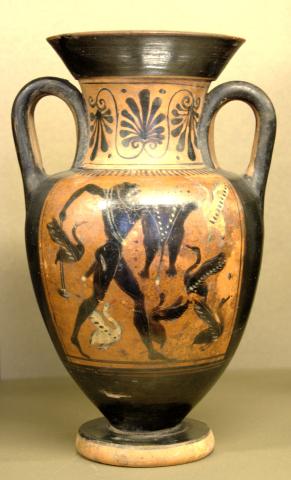Nunc Herculeīs
percussa sonent pectora palmīs;1101
mundum solitōs ferre lacertōs1101bis
verbera pulsent ultrīce manū.
gemitūs vastōs audiat aether,
audiat ātrī rēgīna polī
vastīsque ferōx1105
quī colla gerit vīncta catēnīs
īmō latitāns Cerberus antrō.
resonet maestō clāmōre chaos
lātīque patēns unda profundī
et (quī melius1110
tua tēla tamen sēnserat) āēr.
pectora tantīs obsessa malīs
nōn sunt ictū ferienda levī;
ūnō plānctū tria rēgna sonent.
Et tū, collō decus ac tēlum
suspēnsa diū, fortis harundō,
pharetraeque gravēs,1117
date saeva ferō verbera tergō;1117bis
caedant umerōs rōbora fortēs
stīpesque potēns
dūrīs oneret pectora nōdīs;1120
plangant tantōs arma dolōrēs.
Notes
With a series of jussive subjunctives, the Chorus urges Hercules to beat his chest and arms in mourning, which they imagine would produce a sound so loud as to be heard throughout the Underworld, sea, and sky. Continuing their picture of Hercules’ imagined lamentation, the Chorus tells his arrows, quiver, and club to beat his body.
1100-1 Beating the body (especially the chest and arms) was one of the signs of mourning in the Greek and Roman world. The Chorus imagines that the strength of the blows will make Hercules’ chest “resound.” This is suggested by the alliteration of “p” in the sentence (in fact, the alliterative pectora palmis is a common phrase in Latin poetry). Herculeīs / percussa… palmīs: “struck by Hercules’ palms.”
1101bis-2 It would be more usual to say, “let his avenging hand strike blows on his arms,” but Seneca makes verbera the subject to emphasize the force of the blows: “let blows strike his arms with an avenging hand.”
1101bis mundum solitōs ferre lacertōs: as part of his 11th Labor, Hercules temporarily took over Atlas’s job of holding up the world so that Atlas could get the Apples of the Hesperides for him. This scene is illustrated on one of the metopes of the Temple of Zeus at Olympia. %% The Chorus describes this single event as if it were a regular occurrence: Hercules’ arms are “accustomed” to holding up the world. This way of describing a mythological event can be found elsewhere in Seneca (and other Latin authors); it is perhaps a natural response to the repetitive nature of Greek and Roman mythology and to the fact that individual deeds were thought of as defining features of a god or hero (similarly, at 528 the Chorus calls Hercules’ hand caelifer, “heaven-bearing,” because of his 11th Labor).
1102 ultrīce: i.e., inflicting vengeance or punishment on his body for killing his family.
1103-7 Hercules’ groans will be loud enough to reach both the heavens and the Underworld. Seneca links these two realms with a chiastic pattern of repetition: vastōs – audiat aether – audiat ātrī – vastīsque ferōx. The repetition of vastus (describing Hercules’ groans and Cerberus’ chains) also suggests a link between the fallen hero Hercules and the monster he had just defeated (a similar link is suggested by 1082 fūsus humī).
1104 ātrī rēgīna polī: the “queen of the black world” (Fitch 2018) is Persephone. polus, –ī refers specifically to a celestial pole (which is marked in the northern hemisphere by the pole star Polaris). Poets use the word more generally to refer to the heavens or a region of the world.
1105–7 Prose order: [et] Cerberus ferōx, quī colla vīncta catēnīs vastīs gerit, īmō antrō latitāns. Seneca arranges the words to emphasize the size and ferocity of Cerberus (vastīsque ferōx) and to position Cerberus at the “bottom” of the sentence, surrounded by his “deep cave” (īmō … antrō).
1106 vīncta: > vinciō, vincīre. Do not confuse with victa (> vincō, vincere).
1107 īmō … antrō: the cave is “deep,” because it is located far below ground.
1108 resonet: followed by three subjects (chaos, unda, āēr), which correspond to the three realms (1114 tria regna) of the universe that will echo with Hercules’ laments. chaos: i.e., the Underworld. Because this noun has the sense of “vast emptiness” (see 861n.), it effectively suggests how far the sound of Hercules’ laments would travel. Empty space is also, of course, ideal for transmitting echoes.
1109 lātīque patēns unda profundī: the chiastic word order (adj. A – adj. B – noun B – noun A) juxtaposes two adjectives suggesting wide open space, which again conveys how far Hercules’ laments would travel. The repetition of the syllable und in the last two words evokes a “constant succession of waves.” Other poets produced a similar sound effect: e.g., Catullus’ description of India, litus ut longe resonante Eoa / tunditur unda (“where the shore is struck by the far-sounding Eastern waves,” 11.3–4).
1110-11 This alludes to Hercules’ 6th Labor, where he used his bow and arrow to kill the man-eating Stymphalian Birds (who should be imagined as rather more frightening than the angry geese on this black-figure amphora in the Louvre. quī … tamen: “which, however” or “although it” (referring ahead to āēr). This meaning of tamen is regular after a relative pronoun (LS tamen II.G). melius: it was “better” for the air to feel Hercules’ arrows during his 6th Labor than it is for the air to feel Hercules’ laments now.
1113 sunt … ferienda: passive periphrastic (AG 194); the subject is pectora in the previous line. Do not confuse ferienda ( > feriō, ferīre) with ferenda (> ferō, ferre).
1114 ūnō … tria: Roman poets frequently took advantage of opportunities to play with numbers (their most common word for “meter” or “verse” was in fact numerus). They were particularly fascinated with the interaction between “one” and “many” (here: one lamentation echoing in three realms).
1115 tū: signals an apostrophe to Hercules’ harundō (arrows) and pharetrae (quiver) in the next two lines. collō: ablative with suspēnsa in the next line (“hung from his neck”), indicating how Hercules carried his quiver of arrows. decus ac tēlum: this phrase is in apposition to fortis harundō, / pharetraeque gravēs in the next two lines. It may be translated as a hendiadys: “glorious weapon.”
1116–17 fortis harundō, / pharetraeque gravēs: note the chiasmus (adj. – noun – noun – adj.). harundō is a poetic singular (Hercules has more than one arrow) and pharetrae is a poetic plural (he has only one quiver). %% The flexibility of singular and plural in poetry allows Seneca to accommodate the demands of his metre here. The plural hărūndĭnēs and the singular phărětră each have a sequence of syllables not allowed in anapestic metres (-u- and uuu), since short syllables must always come in groups of two (not one or three). By contrast hărūndō (u--) and phărētrae (uu-) have metrical shapes common in anapests. harundō: the reed could be used to make the shaft of an arrow; thus, by synecdoche, harundō can mean “arrow.” gravēs: quivers are more usually described as “light,” not “heavy,” which explains how gravēs was corrupted to levēs in some manuscripts (e.g., Par. Lat. 8260, left page, 3rd row). But Hercules’ weapons are strong and heavy, suitable to his superhuman strength.
1117bis date: plural imperative > dō, dare.
1118–20 Both rōbora (“oak wood,” a poetic plural) and stīpes (“tree trunk”) refer to Hercules’ club, which was large to suit the mighty hero (it is called gravis at 1024 and 1085).
1118 caedant: “strike,” “beat” (LS caedo I.A.2)
1119–20 “And let the powerful tree trunk [i.e., his club] overwhelm his chest with its hard knots.” The verb onerō, onerāre, literally “weigh down,” may be followed by an ablative of means (AG 408) to describe a body “overwhelmed” with wounds, or with the thing that causes wounds: blows, a club, or (as here) the knots that stand out from a club.
1121 plangant tantōs arma dolōrēs: Hercules’ grief is so great that even his weapons must mourn. The basic meaning of plangant = “strike, beat” is also active, since the Chorus is imagining Hecules striking himself in his grief. tantōs … dolōrēs echoes 1112 tantīs … malīs at the end of the previous section, linking together these two parts of the ode.
Vocabulary
Herculeus –a –um: of Hercules; Herculean
percutiō percutere percussī percussum: to pierce, strike
palma palmae f.: hand, palm
lacertus –ī m.: the arm, esp. the upper arm
verber –eris n.: whip, lash; a beating
pulsō pulsāre pulsāvī pulsātus: to push, strike
ultrīx –īcis: avenging; avenger
gemitus –ūs m.: sigh, groan, lament
vāstus –a –um: empty, desolate; vast
āter atra atrum: black
rēgīna rēgīnae f.: queen
polus –ī m.: pole, heavens
vāstus –a –um: empty, desolate; vast
ferōx ferōcis: bold; wild
collum collī m.: neck
vinciō vincīre vīnxī vīnctum: to bind, tie up
catēna –ae f.: chain, fetter
imus –a –um: deepest, last
latitō –latitāre: to be hidden, hide; lurk
Cerberus –ī m.: Cerberus, three-headed dog of Pluto
antrum –ī n.: cave
resonō resonāre resonāvī resonātus: to make noise again, resound, re-echo
Chaos (only in nom. and acc. sing.) n.: void, boundless space; the Underworld
patēns –entis: open; broad
profundus –a –um: deep, vast; the deep
melius; optimē: better; best
obsideō obsidēre obsēdī obsessus: to remain; occupy, beseige
feriō ferīre: to strike, hit
plānctus –ūs m.: a banging; beating (of the breast)
collum collī m.: neck
suspendō suspendere suspendī suspēnsum: to hang, suspend; stop; be anxious
harundō –inis f.: reed; rod, crown, arrow
pharetra –ae f.: quiver
verber –eris n.: whip, lash; a beating
umerus umerī m.: shoulder
rōbur rōboris n.: oak, strength
stīpes or or stips –itis m.: log, post; tree trunk
onerō onerāre onerāvī onerātus: to load, burden
nōdus –ī m.: knot
plangō –ere –plānxī –planctus: to beat, strike; lament


